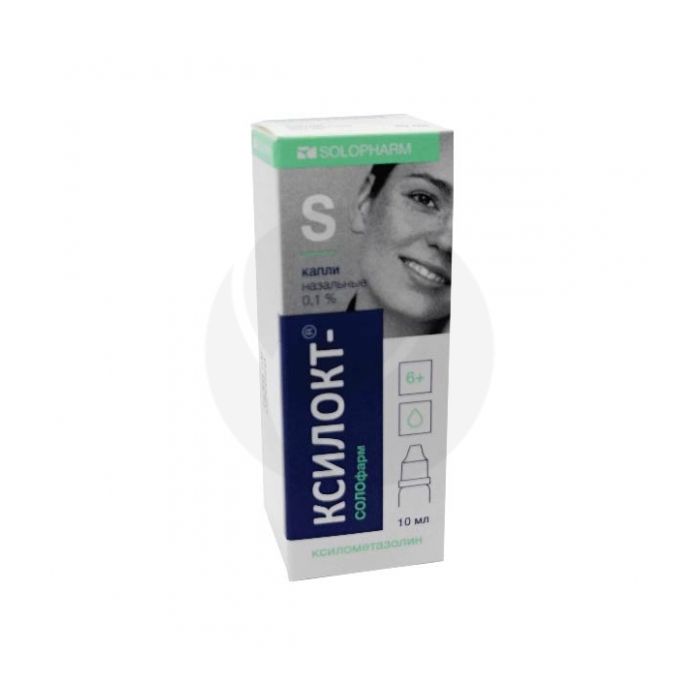Xyloct drops 0.1%, 10ml
Expiration Date: 05/2027
Russian Pharmacy name:
Ксилокт капли 0.1%, 10мл
Acute respiratory diseases with symptoms of rhinitis (runny nose), acute allergic rhinitis, hay fever, sinusitis, eustachitis, otitis media (to reduce swelling of the nasopharyngeal mucosa).
Preparing the patient for diagnostic manipulations in the nasal passages.
Intranasally (in each nasal passage).
A solution of the drug with a concentration of 0.1%: adults and children over 6 years old - 2-3 drops in each nasal passage 2-3 times a day (if necessary, you can repeat it); should not be applied more than 3 times a day.
The drug is used for no more than 7 days.
1 dose of the drug contains:
Active ingredient: xylometazoline hydrochloride - 1.0 mg,
Excipients: benzalkonium chloride - 0.15 mg, disodium edetate (Trilon B) - 0.5 mg, sodium hydrogen phosphate dihydrate - 3.54 mg, sodium dihydrogen phosphate dihydrate - 3.63 mg, sodium chloride - 9.0 ?g, water for injection - up to 1 ml.
- Hypersensitivity to the components of the drug;
- Arterial hypertension;
- Tachycardia;
- Severe atherosclerosis;
- Glaucoma;
- Atrophic rhinitis;
- Thyrotoxicosis;
- Surgical interventions on the meninges (in history);
- Conditions after transsphenoidal hypophysectomy;
- Pregnancy.
Do not use during therapy with monoamine oxidase inhibitors and tricyclic antidepressants (including a period of 14 days after their withdrawal).
Carefully
Diabetes mellitus, prostatic hyperplasia, ischemic heart disease (angina pectoris), pheochromocytoma, hyperthyroidism, lactation period; with hypersensitivity to adrenergic drugs, accompanied by insomnia, dizziness, arrhythmia, tremor, increased blood pressure.
pharmachologic effect
Xylometazoline belongs to the group of local vasoconstrictor agents (decongestants) with a 2-adrenomimetic effect. It has a quick, pronounced and prolonged vasoconstrictor effect on the vessels of the nasal mucosa, thus eliminating its swelling and hyperemia. Restores the patency of the nasal passages, facilitates nasal breathing with rhinitis.
In therapeutic concentrations, it does not irritate the mucous membrane of the nasal cavity, does not cause hyperemia. The action begins in a few minutes and lasts for 10-12 hours.
Pharmacokinetics
When applied topically, it is practically not absorbed, plasma concentrations are so small that they cannot be determined by modern analytical methods.
Side effects
With frequent and / or prolonged use - irritation and / or dryness of the nasopharyngeal mucosa, burning, tingling, sneezing, hypersecretion of the nasopharyngeal mucosa, hypersensitivity reactions, swelling of the nasal mucosa, palpitations, tachycardia, arrhythmia, increased blood pressure, headache , nausea, vomiting, insomnia, visual impairment, depression (with prolonged use of high doses).
If any of the side effects indicated in the instructions are aggravated or you notice any other side effects not listed in the instructions, inform your doctor.
Interaction
Xylometazoline should not be used in patients receiving therapy with monoamine oxidase inhibitors and tricyclic antidepressants (including a period of 14 days after their withdrawal) due to the possibility of increased blood pressure.
Overdose
Symptoms: increased side effects (dose-dependent), decreased body temperature, confusion. In case of accidental ingestion, the drug can cause: severe dizziness, increased sweating, headache, bradycardia, increased blood pressure, respiratory depression, coma and convulsions. After an increase in blood pressure, a sharp decrease can be observed.
Treatment: symptomatic.
Special instructions
Avoid contact with eyes.
In order to avoid the spread of infection, it is necessary to use the drug individually.
The recommended dose should not be exceeded and the drug should not be used for a long time (more than 7 days). Long-term use of the drug can cause a 'rebound' effect (medication rhinitis), the risk of reactive hyperemia and atrophy of the nasal mucosa increases.
Since the drug contains benzalkonium chloride as a preservative, especially with prolonged use (more than 7 days), edema of the nasal mucosa may develop. If you suspect a similar reaction (nasal congestion), it is necessary, if possible, to use a drug that does not contain preservatives. If such medicines are not available, a different dosage form must be used.
Influence on the ability to drive vehicles and mechanisms
Xylometazoline can affect the ability to drive vehicles or equipment.
When treating with the drug, care must be taken when driving vehicles and engaging in other potentially hazardous activities that require increased concentration of attention and speed of psychomotor actions.

